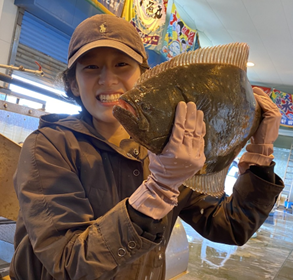Embracing New Talent: Miyu Fujimoto
By Gunther Errhalt & Miyu Fujimoto
A senior at Tokyo University of Marine Science and Technology, specializing in Fisheries Economy and Management. Her passion for this field ignited when she discovered the abundance of delicious but unused fish called "Miryougyo" (未利用魚) that were being thrown away at restaurants. This led her to delve into the study of fisheries with a focus on sustainability. Having spent most of her school days in Korea, she speaks both Korean and English.
Currently, she works at Errhalt Consulting, where she learns about the ongoing changes in Japan's fisheries system and worldwide. Her recent interests in fisheries revolve around trade and addressing IUU (Illegal, Unreported, and Unregulated) fishing practices. During her free time, she enjoys traveling across Japan to visit fishing villages, where she observes fixed-net fishing and experiences aquaculture to gain a deeper understanding of Japanese fisheries. Additionally, she has a fondness for aquariums and enjoys capturing photographs there.
As a member of the company, she strives to make valuable contributions to her work while also maintaining a balance with her studies.
The Importance of Mentorship
Gunther Errhalt:
While attending graduate school, I had the opportunity to visit the United Nations and the World Trade Organization in Geneva. The school had arranged meetings with numerous diplomats and government officials working in these institutions. One of my graduate program assignments was to question these officials about the Doha Round. The WTO Doha Round was a series of trade negotiations held from 2001 to 2015 with the aim of reducing trade barriers, particularly in agriculture and manufacturing, to promote global trade and economic development. Despite efforts, the negotiations were unable to reach a comprehensive agreement, although some individual agreements were made along the way. On multiple occasions, when discussing agriculture, these officials mentioned the importance of fisheries and the likelihood of future dialogues on the subject.
At that point, fisheries hadn't been a topic I had deeply contemplated. However, the combination of environmentalism, diplomacy, and trade fascinated me. While working as a trade analyst for the University of St. Gallen, I came across the North Pacific Fisheries Commission (NPFC). I saw an opening for a position and immediately applied. Despite lacking experience in the fisheries world, I managed to secure the position and joined in the summer of 2018. The compliance manager at the time, Peter Flewwelling, took me under his wing and taught me a great deal about fisheries compliance. Although I was still new to the industry, he entrusted me with responsibilities and encouraged me to think outside the box. Under his mentorship, I experienced substantial personal and professional growth in this field, gaining both valuable experience and confidence in my work.
As my consulting contract came to a close, I had acquired extensive knowledge during my time under his guidance, leading to an immediate offer from Global Fishing Watch to join as a regional fisheries analyst. There, I had the pleasure of working with individuals like Tony Long and Charlie Kilgour, who understood and supported my ideas. Nurturing talent in supportive environments empowers the younger generation to thrive. We should give interns and junior staff the opportunity to grow and contribute their ideas, recognizing that a lack of experience does not equate to a lack of creativity or intellect.
With Miyu Fujimoto beginning her internship at Errhalt Consulting, I hope to assist her and all future juniors in gaining valuable experience and propelling their careers. Whether interns or junior staff stay with us or move on, let us ensure that we can be proud of their accomplishments when we encounter them in their future positions. It is crucial to remember that the world of fisheries is interconnected, and the challenges we face are global. By mentoring and supporting others, we can foster more allies in the ongoing global struggle against IUUF (Illegal, Unreported, and Unregulated Fishing).

